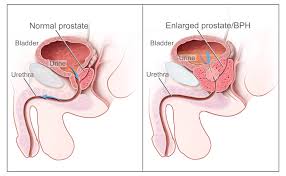Prostatic Hypertrophy is a common problem many men face as they get age. This issue starts when the prostate gland enlarges, and therefore, it becomes a reason for uncomfortable urinary symptoms. Even this problem may lead to bladder, urinary, and kidney problem. Today, I will share details about its symptoms, causes, diagnosis, and different treatments you can consider to cure BPH/ Benign prostatic hyperplasia.
What are the symptoms of BPH?
Here are common symptoms you will observe if you have prostate gland enlargement condition.
- Frequent or urgent need to urinate
- Increased frequency of urination at night (nocturia)
- Difficulty starting urination
- Weak urine stream or a stream that stops and starts
- Dribbling at the end of urination
- Narrowing of Urethra
- Inability to completely empty the bladder
- Bladder or Kidney stones
- Prostate/Bladder Cancer
Sometimes, you notice blood in the urine, or simply unable to urinate. Even a urinary tract infection is a less common symptom related to this issue.
What are the leading causes of BPH?
The Prostate gland is found under the bladder. There is a tube which moves urine from the bladder to the penis’s urethra passes via the center of the prostate. In the case of prostate enlarge, then it starts blocking urinary flow. Therefore, people who have BPH condition often find it hard to urinate and feel an urgent need to urinate.
Typically, this condition is less common in men below 40 years old. The growth of prostate gland continues throughout a man’s life. Men experience BPH after they get older than 40 years, and this condition is common in men aged 60-80 years.
When to Seek BPH Treatment?
If symptoms of BPH don’t bother you much, then you can make some lifestyle changes to improve your condition. That’s mean you can:
Drink less liquid, alcohol, and caffeine in your routine. Drink less water before bedtime. So, you don’t need to use the toilet again and again at night.
Don’t use over-the-counter medication that much. People used to take cold and sinus medication from a store and use it. Some of these medications have side effects, and they might treat your apparent problem, but it can worse prostate enlargement issue. So, it is suggested to read labels on products before you purchase them.
However, when lifestyle changes don’t work for you and urinary flow is not normal. You should visit your doctor and take his advice on the matter.
What are the best Treatments for Prostatic Hypertrophy?
Treatment is always based on your symptoms, urinary track condition, and your age.
1.Prescription Medication
This treatment is suggested by the doctor when you are at risk for a complication related to BPH like you are unable to empty your bladder in the usual routine. Even you can go for medication when mild symptoms are apparent, and you have doubts that the condition won’t improve, but it will get worse with time.
There are three classes of drugs available to treat moderate BPH, such as:
- Alpha Blockers: They are common to treat BPH as they relax prostate muscles and bladder neck to offer the patient some ease from symptoms. The typical examples of these medications are doxazosin (Cardura), terazosin (Hytrin), tamsulosin (Flomax), and alfuzosin (Uroxatral).
- 5-alpha reductase inhibitors (5-ARIs): The purpose of this medication is to shrink the prostate and also to prevent its further growth. They include finasteride (Proscar) and dutasteride (Avodart). One thing you should know at this point is that the FDA requires 5-ARIs to show warning signs that this medication is linked to prostate cancer.
- Phosphodiesterase 5inhibitors (PDE5 inhibitors): This medication improves urine flow rate by improving prostate symptom score. It includes sildenafil (Viagra), Tadalafil (Cialis), Vardenafil (Levitra).
2. Supplements
There are certain supplements which help improve enlarge prostate gland condition. According to some small studies, Saw Palmetto bring some health benefits. Other supplements include Beta-sitosterol, Rye Grass, and Pygeum. Before you start using any supplement, make sure to ask your doctor as they may cause some problems with your prescribed medications.
Surgery
When BPH doesn’t respond well to medication or supplement, and you have associated risk such as urinary tract infection, bleeding, stones in the bladder and urinary retention or kidney damage then the doctor may advise you to consider going through a surgery.
Traditional open surgery is quite common. However, these days doctor prefer to go with the minimally invasive procedure in which a surgeon makes a small incision and insert probes through the patient’s penis. This type of treatment is getting popular these days as it is less painful and cause little scarring while the recovery rate is fast. find more about BPH cure.
Wrap Up
Finally, you have got all the necessary details about the enlarged prostate gland, its symptoms, and best treatment options. Self-medication is not advised at any step of this condition. You can start your treatment by making some lifestyle changes, but when the condition persists, then it is suggested to consult with a doctor because only he is the one who can make a proper diagnosis and recommend you the most suitable treatment according to your current condition.








